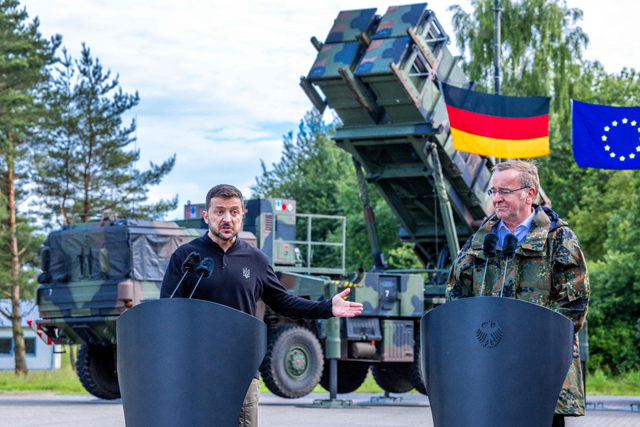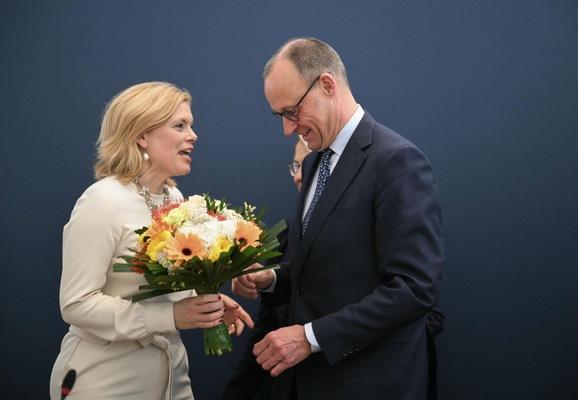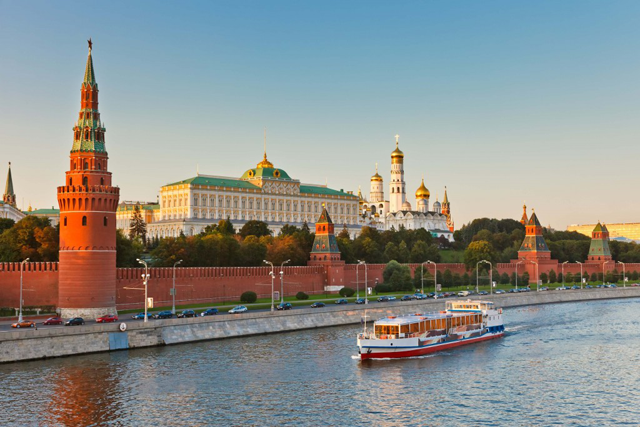You are here
German far-right, far-left MPs boycott Zelensky speech on Russia
By AFP - Jun 12,2024 - Last updated at Jun 12,2024

Ukrainian President Volodymyr Zelensky (left) and German Defence Minister Boris Pistorius hold a press statement after a visit to a military training area in Mecklenburg-Vorpommern, north-eastern Germany, on Tuesday (AFP photo)
BERLIN — German far-right and left-wing nationalist lawmakers boycotted a parliamentary address on Tuesday by Ukrainian President Volodymyr Zelensky, who earlier had warned that pro-Russian rhetoric posed a growing danger to EU nations.
Zelensky’s speech came at the start of a diplomatic whirlwind tour to shore up support for Kyiv’s battle against Russia.
In an illustration of the increasing headwind Kyiv faces to obtain backing, MPs from Germany’s far-right AfD and far-left BSW parties boycotted Zelensky’s address to parliament.
Both parties made huge gains in Sunday’s European elections, with the AfD scoring higher than all three parties in Chancellor Olaf Scholz’s coalition, while the BSW, a newcomer which campaigned against weapon deliveries to Ukraine, took just over 6 per cent.
Zelensky cautioned that the parties’ stance posed a threat that stretched beyond Ukraine.
“It seems to me that the most important thing is that people did not choose pro-Russian populist rhetoric. But radical pro-Russian rhetoric is dangerous for your countries,” Zelensky warned, speaking at a press conference before his parliament address.
The co-leaders of the AfD said they “refused to listen to a speaker wearing camouflage fatigues”.
“Ukraine does not need a war president now, it needs a peace president who is ready to negotiate,” said Tino Chrupalla and Alice Weidel, adding that AfD MPs had therefore decided to leave their seats empty at the Bundestag on Tuesday.
Not only in Germany but across the EU, the far-right’s gains have triggered fears over the future of Western backing for Ukraine.
Ahead of a peace conference for Ukraine in Switzerland, to which Russia is not invited, parties like the AfD are pushing the message that the West’s current strategy to arm Ukraine will not bring an end to hostilities.
But Scholz, speaking at a Ukraine reconstruction conference in Berlin, vowed not to let up support for Kyiv.
He urged allies to rush air defence systems to Ukraine to help the country fend off Russia’s missiles, and said that Russian President Vladimir Putin will not be allowed to win the war.
“There will be no military victory and no dictated peace,” Scholz said, adding that Putin must “end his brutal campaign and withdraw his troops”.
Zelensky also pleaded for help.
“Russia’s greatest strategic advantage over Ukraine is superiority in the sky. It is missile and bomb terror that helps Russian troops advance on the ground,” Zelensky said, adding that “air defence is the answer”.
Germany has contributed three Patriot air defence systems to Kyiv, while Zelensky said a total of seven Patriots are needed for Ukraine to shield its urban centres from the storm of Russian missiles.
Later Tuesday Zelensky visited a military training area in Sanitz, northern Germany, where Ukrainian troops are trained on the Patriot systems, along with German Defence Minister Boris Pistorius.
Pistorius promised Ukraine a further 100 Patriot missiles — which he described as a “significant number” — as well as additional sniper rifles, anti-tank weapons and drones.
The minister added that he had seen during visits to Ukraine “how crucial air defence is for survival”.
Air attacks
After almost a year of stalemate, Ukraine has been forced to abandon dozens of frontline settlements this spring, with Russian troops holding a significant advantage in manpower and resources.
Russia on Tuesday said it had captured two more villages in eastern Ukraine: Timkovka in the north-eastern Kharkiv region and Miasozharivka, calling it by its Russian name of Artemovka, in the eastern Lugansk region.
Ukrainian prosecutors meanwhile said five people had been wounded in an overnight Russian strike on the frontline town of Kostyantynivka.
With the war at a critical juncture, Zelensky is ramping up a diplomatic offensive for support.
After Berlin, Zelensky will head to the G7 summit in southern Italy, which will be attended by leaders including US President Joe Biden.
G7 leaders hope to agree a deal on using the profits from the interest on 300 billion euros ($325 billion) of frozen Russian central bank assets to help Kyiv.
Swiss peace summit
After the G7 meeting, Zelensky will head to Switzerland for the peace summit from Saturday, to be attended by representatives from some 90 countries and international organisations.
Organised at Ukraine’s request, the summit’s outcome remains uncertain, though Switzerland is hoping to secure a joint final declaration.
However Biden is skipping the summit, with Vice President Kamala Harris attending instead, in a blow to Zelensky who had pushed for the US president to participate.
The Kremlin has repeatedly said it would not participate in any negotiations if Kyiv does not accept Moscow’s annexation of the approximately 20 per cent of Ukrainian territory Russia currently occupies.
Moscow’s key ally China will also be absent from the conference.
Related Articles
BERLIN/ KYIV — Any decision to send F16 fighter jets to Ukraine will fall on the White House, the UK and German defence ministers said Wedne
BERLIN - Germany's conservative election winner Friedrich Merz faced an uphill struggle to build a coalition government on Monday, a day aft
MOSCOW — The Kremlin on Monday said the content of leaked conversations between German officials discussing potential strikes on Crimea prov













